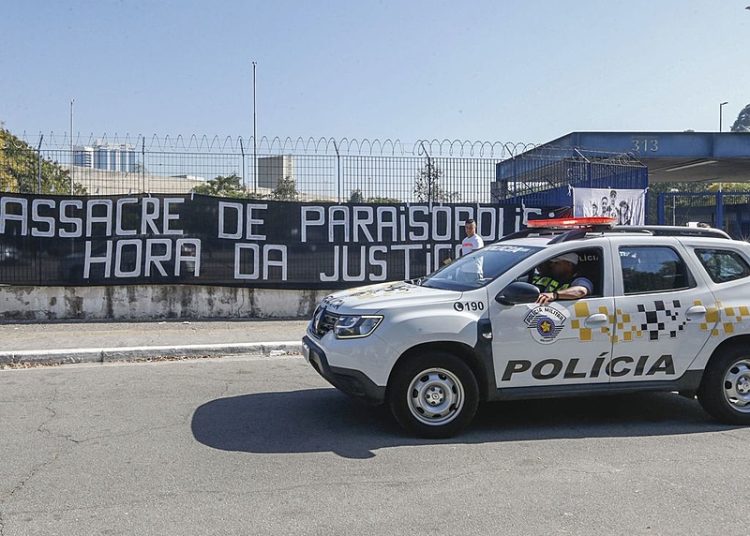One of the main aspects of the first day of the Paraisópolis Massacre trials at the Barra Funda Criminal Forum, in the western zone of the city of São Paulo (state of São Paulo) was the report of two witnesses who stated that the victims of the police action arrived already dead to the hospital in the early hours of December 1, 2019.
"The two doctors who gave testimony were very decisive in stating that the victims arrived dead at the hospital. As a result, we can conclude that the police altered the crime scene. The victims died in Paraisópolis and the police improperly transported the bodies, altering the crime scene," Dimitri Sales, president of the State Council for the Human Rights Defense (Condepe), told Brasil de Fato on Tuesday night, July 25th.
Mr. Sales points out that the witnesses' reports confirm Condepe's thesis, that the police operation that resulted in the murder of nine young people who were at the DZ7 Ball, in the neighborhood of Paraisópolis, on that occasion, would have been premeditated by the Military Police of the State of São Paulo, with the intention of criminalizing the ball, "for the sake of revenge" after the death of a lieutenant from the corporation.
"We are very convinced that the witnesses contributed enormously to the thesis that the police previously set up an operation not complying with protocols and, as a consequence, assuming the risk of what would come from that operation, which were the nine deaths", says Sales. "In general, the witnesses confirm the thesis that the police acted with possible malice and therefore should be taken to a popular jury", the president of Condepe defends.
'Criminals in uniform are killing our people'
This Wednesday morning, relatives of the victims and human rights organizations gathered to ask for justice and demand that the military police be held accountable. “Criminals in uniform are killing our people. We want to live. If there was a child of rich people among ours, it would be a different situation. Unfortunately, they were all from the periphery”, says Maria Cristina Quirino, mother of Denys Henrique, one of the nine fatal victims.
Among the 31 military police officers who participated in the operation, only 12 became defendants and will now face trial. For the relatives of the victims and their defense, there was connivance of the State and the organs, with the police lethality.
During the act, Quirino lamented that one of the lines adopted by the police defense lawyers is the criminalization of funk music and the nine murdered youths. “They already tried to do that back in the beginning, when the Military Justice asked for the toxicological examination of our children, trying to claim that the possible cause of death was because they were under the influence of narcotics. This attempt is yet another narrative they use to criminalize [the nine youths] and get away with the crime they committed."
Remember the case
On the night of December 1, 2019, images of the violence promoted by the 16th Battalion of the São Paulo Military Police at the DZ7 Ball in the community of Paraisópolis, in the south region of São Paulo, flooded social networks.
On that date, Operation Pancadão, recurrently promoted by the state, caused the death of nine young people, between 14 and 23 years old. The case became known as the Paraisópolis Massacre.
Most of the youths died of asphyxiation after the release of pepper spray and gas bombs by the Military Police, who cornered the participants of the event. One of them died from trauma.
In the Military Court, the Internal Affairs of the Military Police investigated the conduct of 31 military police officers who were involved in the action. The agency concluded that the military police did not cause the deaths of the ball goers.
Victims who went out to have fun and were unable to return home were: Marcos Paulo Oliveira dos Santos, 16 years old; Bruno Gabriel dos Santos, 22; Eduardo Silva, 21; Denys Henrique Quirino da Silva, 16; Mateus dos Santos Costa, 23; Dennys Guilherme dos Santos Franco, 16; Gustavo Cruz Xavier, 14; Gabriel Rogério de Moraes, 20; and Luara Victoria de Oliveira, 18.




